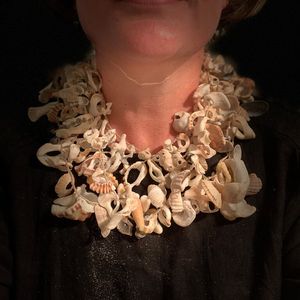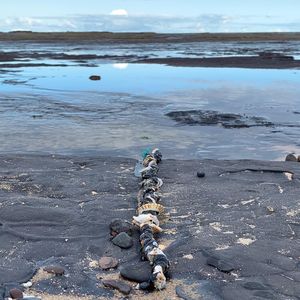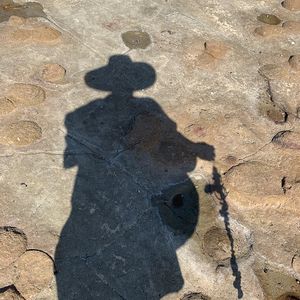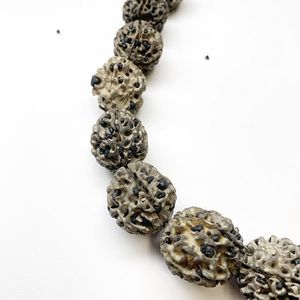Article: Melinda Young Mapping the Tideline
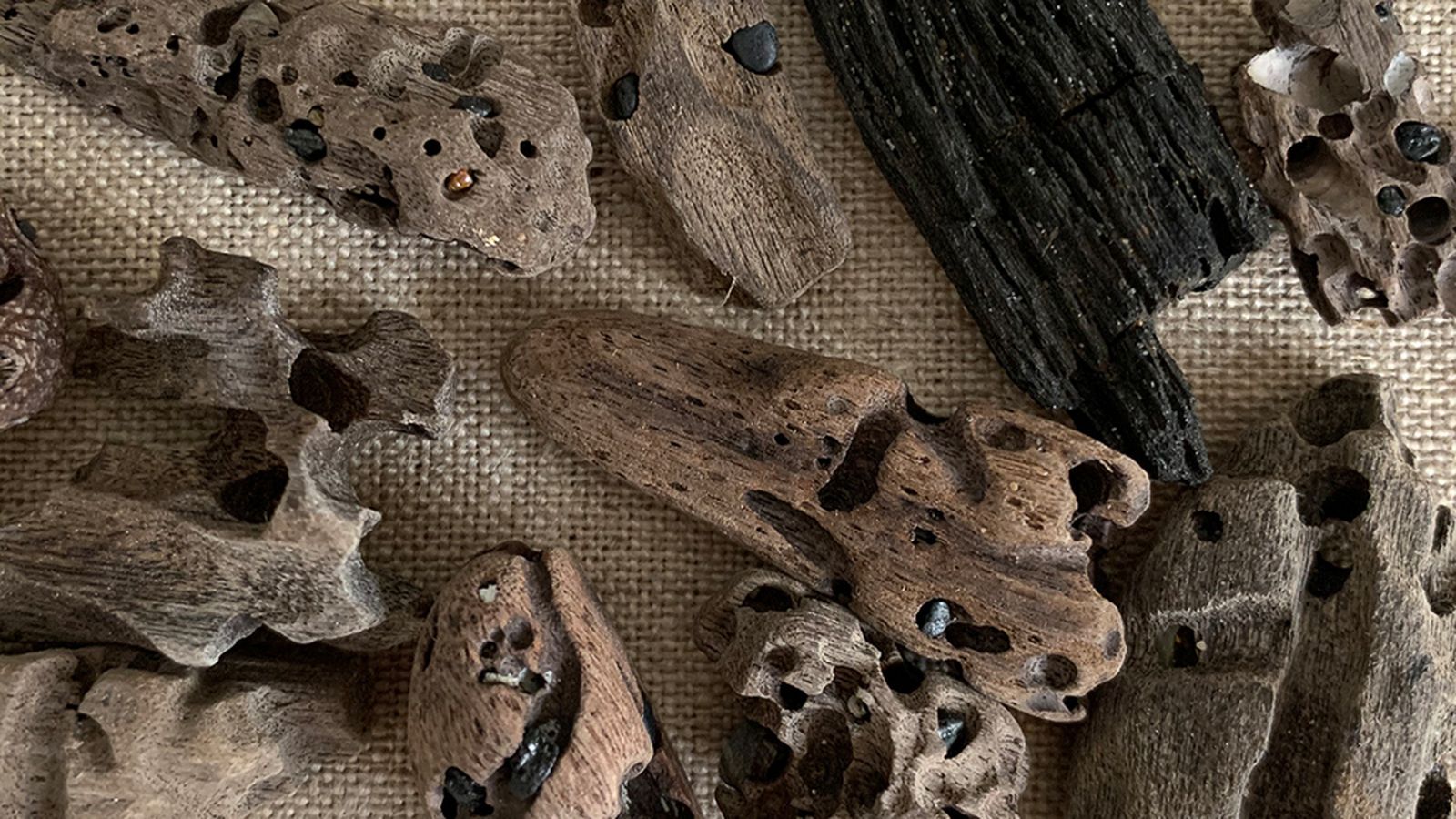
Melinda Young uses jewellery as a way to attach herself to the coast during the lockdown. This article was first published in Garland.
On 16 April 2020 I wrote the following on the Critical Craft Forum Facebook page:
“Without time and access to workshop, I’ve pared my making back to the basic. I’m at the very start of a PhD about landscape and jewellery and fortunate to live near a beach – perfect for iso-exercise. Recently the ocean has been generous gifting shells on the shoreline. I am collecting the ones with holes and twisting them into a string as I go, cataloguing each walk with a necklace. It’s mindful (and mindless) and perhaps a kind of madness… but it is something.”
As the weeks of “sheltering in place” have unfolded, the practice of collecting and threading shells I started on March 21st has continued. Concurrently I have been reading around place, practice and human geography for my PhD, commenced in early March at the Australian Centre for Culture, Environment, Society and Space (ACCESS) part of the School of Geography and Sustainable Communities at the University of Wollongong. Some background: the consequence of the imperative to stay at home, undertake home-schooling and only go out to exercise or gather essential items at this time means that the making I am doing is different to what I had planned—everything else has stopped.
This is making whilst walking (which, subversively for some in my beach-side community, includes stopping, looking, resting). It is keeping myself and my son active and sane. We have the walk factored into each day of home school and are thankful always that we live where we do.
We make beach structures together, and for a few weeks collaborate with other unseen beach architects on a large stick structure. Instead of my usual practice of sitting and weaving on the beach, I notice whilst walking that the ocean has deposited more shells than usual along the tideline. I start collecting shells with holes, spinning them onto the string I carry for weaving as I pick them up (although sometimes the tideline provides the thread as well). I discover that as I walk, look, collect, spin; I have developed a kind of “time-space routine” from which has emerged a ‘place ballet… a rhythm of life in place’. [1]
This idea is enchanting; an evocative metaphor for this experience of place and time. Eventually, the project is named as I become conscious of the action—mapping the tideline—and my reason for conscientiously tagging each shell necklace with the date, location and tide. By the end of April, the necklace collection exceeds twenty and as its physical and metaphorical weight grows, although by now the emotional weight of this period of time seems to be lifting a little. We have settled into place, a new routine, acceptance of loss and are starting to look towards what we have gained instead.
As I become more intimately familiar with the tides, the nooks the crannies of the coast scape, I am finding more and more sources of wonder. Such as the cache of blue quandong seeds washed far from home by the tide and carried by a current to this exact location—only to be discovered in one small area of the rock platform. The crenellated surfaces of the quandongs (and many of the pieces of driftwood) are filled with tiny pieces of coal, making them at once from there and part of here. Other walks yield materials from the streetscape as amidst the quiet a frenzy of garden care takes over our little town and palm trees and grevilleas leave foliage for me to try and weave into vessels.
In mid-April, weather conditions and shifting tides deliver shards of driftwood to the tideline. Drilled and textured by miniature creatures, their physical lightness is a counterpoint to the weight of the shells. The driftwood becomes part of the collection process. It too is labelled, catalogued and slowly each piece is being made into brooches that can later be installed collectively across a gallery wall before finding homes individually on bodies. Teasing the idea of physical and metaphorical attachment I consider the humanist geographer Yi-Fu Tuan’s (prophetic) idea that “Place is a product of a pause and a chance of attachment”.[2]
At 25 May 2020 the Mapping the tideline body of work comprises 23 necklaces, 5 coiled vessels and 133 brooches. An isolation collaboration with my local environment.
[1] Cresswell, Tim (2004) Place: a short introduction. Blackwell Publishing, Oxford, UK
[2] Tuan, Yi-Fu (1977) Space and Place: The Perspective of Experience. University of Minnesota Press, Minneapolis
Melinda Young lives in Thirroul, a seaside town nestled between the Illawarra escarpment and the ocean, on Dharawal country 80km south of Sydney. Her practice engages with jewellery, textiles, installation and interactive public art projects and she has exhibited extensively in Australia and internationally. Melinda is an Associate Lecturer at UNSW Art & Design and undertaking a cross-disciplinary PhD at the Australian Centre for Culture Environment Society and Space, University of Wollongong.
Melinda’s lockdown work is currently on show at Australian Design Centre as part of the Isolate Make exhibition and you can follow her creative journey via Instagram @unnaturaljeweller.
This article was first published on Garland.

